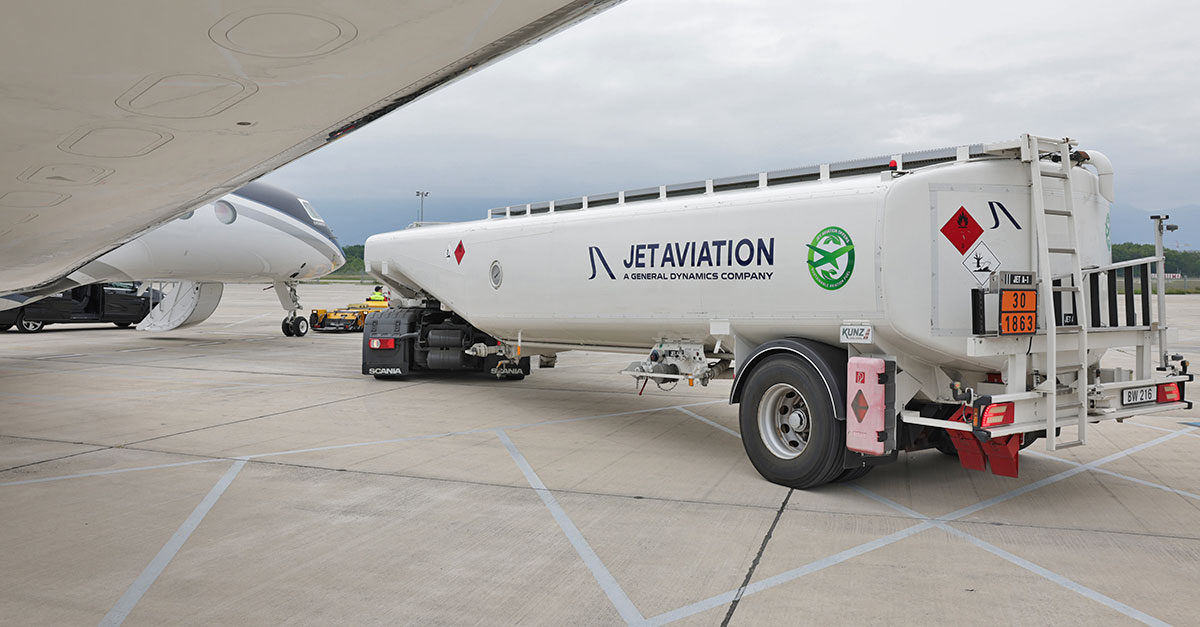Operators Voice Concerns That EU SAF Regulations Won’t Support Business Aviation

25 May 2023
Approximately four years into wide-scale production of sustainable aviation fuel (SAF), production, distribution and availability continues to be an issue in the business aviation sector, particularly in Europe, according to an expert panel who gathered at the 2023 European Business Aviation Convention & Exhibition (EBACE2023).
The drop-in jet fuel – made from sustainable feedstocks instead of petroleum – plays a large role in business aviation’s goal of reaching net-zero carbon emissions by 2050. In its purest form, SAF can cut total lifecycle emissions by as much as 80%.
Globally, roughly 300-400 million liters (79-105 million gallons) of SAF were delivered across all aviation sectors in 2022, a 200% increase over 2021, according to the International Air Transport Association. But rising demand for SAF and a relatively low supply is prompting business aviation operators in Europe to call for regulations mandating a SAF book-and-claim system.
“It’s important that we all move forward together into a new system and that any kind of operator in Europe should be able to directly access SAF or a volunteer book-and-claim with common rules,” said panelist Thierry Lamant of Dassault Aviation.
Generally, at airports where SAF is unavailable, operators can use an independent “book-and-claim” transaction to purchase SAF on paper that would be used to fuel jets elsewhere at airports where SAF is available. This system is a way to leverage voluntary demand for SAF by inserting it into the conventional fuel supply chain. It allows operators to claim the environmental benefits from SAF without actually using it directly, while helping them to reach net-zero emissions.
The situation has driven the European Union to propose the Refuel EU Directive, details of which are now in final negotiations, said Ewa Oney, head of sustainable aviation for the European Commission’s Directorate General for Mobility and Transport.
Proposed Mandates
Refuel EU includes mandates that force fuel suppliers to provide a minimum share of SAF at EU airports beginning in 2025 at 2% and reaching 70% by 2050. Oney said those percentages will likely shift during final negotiations.
“Depending on who you ask, the mandates probably should be more aggressive, more ambitious,” said Toby Edwards, co-CEO at Victor, an on-demand charter operator. “And I also don’t think we should underestimate how important the voluntary demand is in assisting the mandates.”
“We should set ambitious targets, with flexibility on how to deliver that in order to reach those targets by 2050,” said panelist Sven Rieve, sustainability adviser for AIR bp.
But Oney said “book-and-claim was not part of the commission proposal” for Refuel EU. “We don’t have currently enough knowledge [on the topic] and so we need to be able to meet the proper analysis for that.”
That prompted concern from EBAA Sustainability & Future Workforce Manager Maureen Gautier who said, “From a business aviation perspective, it’s very important that book-and-claim is included, because our aircraft fly usually to remote airports or islands and there’s just no other way to get SAF. So it would be a real shame not to take into consideration those types of movements.”
The legislation is also expected to govern which EU airports will receive SAF deliveries. Gautier said it was possible that business aviation airports would be excluded. “It’s really tricky for us to understand how our industry is going to be impacted by Refuel EU if the obligation to supply SAF isn’t intended to be supplied to business aviation airports,” she said.
That concern was echoed by Lamant, who acknowledged he is “especially afraid because the airlines are making strong commitments for their own procurement of SAF. I’m afraid that will drive [SAF] production mainly to the airlines. And there is a risk to business aviation, if we don’t unify ourselves.”
Oney said an “opt-in approach” was being discussed in negotiations “which would allow the airport as well as aircraft operators to voluntarily decide if they want to be in the scope of the legislation. That could be something interesting for business aviation to be encouraged to work with the airports.”


